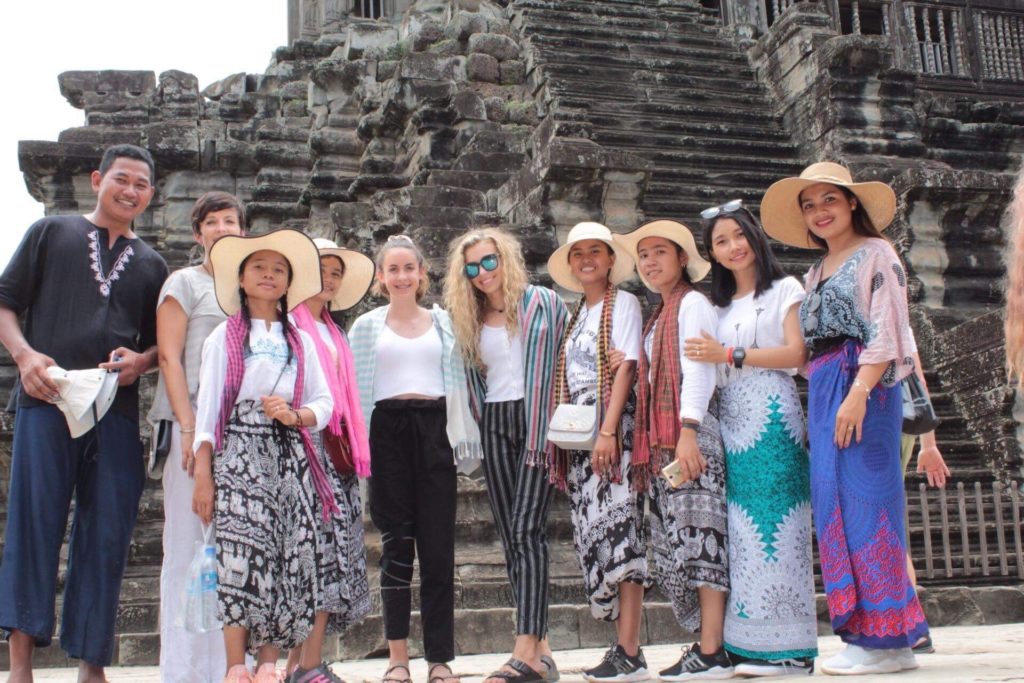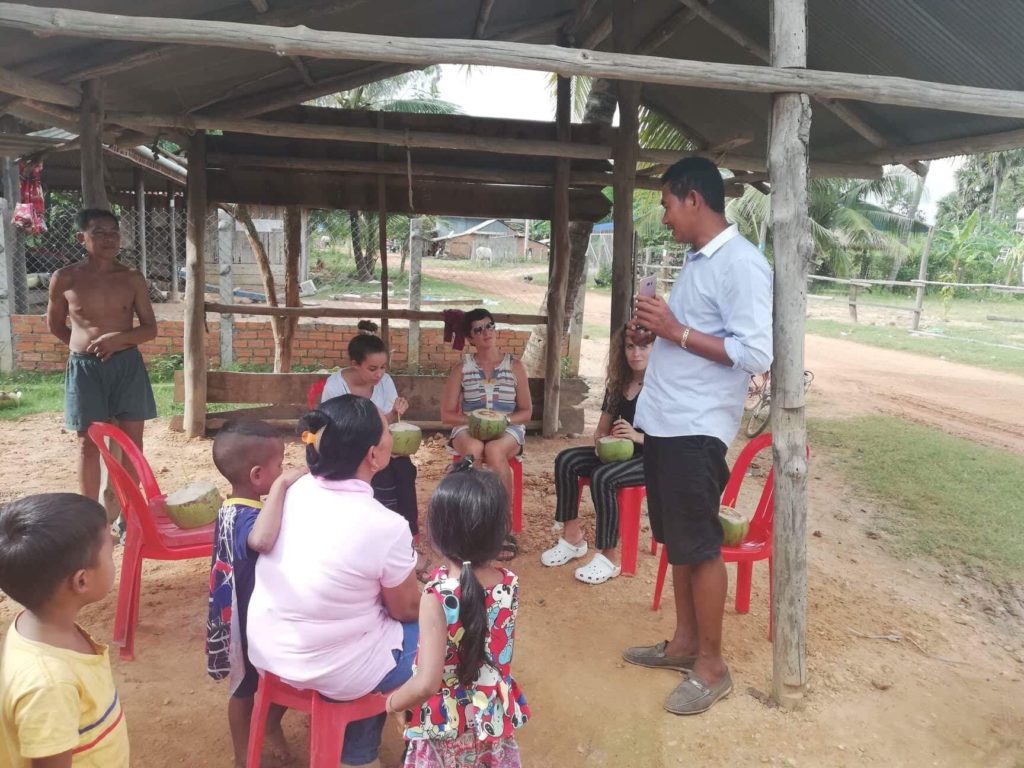
Lighthouse Volunteering Spotlight: Jamie's Story
|
August 17, 2018
By Jamie Brown
In honor of International Youth Day on August 12, 2018, Lighthouse donated more than 25 bicycles to The Chelly Foundation on behalf of the children of Chumkuri, Cambodia. The Chelly Foundation is a non-profit charity providing educational and health services to Cambodian youth. Earlier this month, Lighthouse's Jamie Brown, Vice President of Advisory Services, who serves on The Chelly Foundation Board, spent two weeks in Cambodia to experience life in the village in hopes of better supporting the Foundation's mission. Here's an article describing her experience.
I'm en route to the U.S. from Cambodia, where I've been traveling the past 12 days with my 13-year-old daughter, Ellison, and 16-year-old niece, Lauren. I love traveling (as anyone who knows me will attest), mostly to far away destinations where I've never been, where the food, culture, and environment are completely foreign and I really feel like I'm going somewhere interesting.
I'm a planner, the "Type A-" kind, and will spend days putting together the perfect itinerary (loosely planned with some room for spontaneity, hence the A minus) with finds curated from various travel magazines, books, blogs, and personal recommendations for off-the-beaten-path restaurants, hotels, and things-to-do and see. I say that because this was not my usual trip, which was a little unsettling for me, but exciting at the same time.
I serve on the Board of The Chelly Foundation, a non-profit founded by my friend and colleague, Jason R. Baron. Jason started the Foundation in honor of his late mother, Chelly Baron, who had a lifelong passion for reading and education. In the last years of her life, Chelly struggled with multiple sclerosis and was cared for by a health worker named Nan Nop. Nan grew up in Chumkuri during the Khmer Rouge regime in the 1970s, and came to the U.S. from Cambodia in 1999. Chelly passed away in 2012, and shortly after, Jason approached Nan with the idea to use her life as inspiration to build a library for the children in Nan's village.
Touring Angkor Wat with high school students from Chumkuri, a rural village about 5 hours from Siem Reap.

Since its inception a few years ago, The Chelly Foundation has made serious inroads in education. Among other accomplishments, the Foundation built a free-standing library at the local high school in Chumkuri—the only one existing anywhere at a public school in Kampot Province. The Foundation has also built new hand washing stations and toilets used by over 3,000 school children in local schools, provided clean water facilities, and given away school supplies, books, uniforms, and bicycles. And, come this fall, 16 high school students (13 young women and 3 young men) will be receiving full four-year scholarships to attend the Royal University of Phnom Penh and peer institutions. I am impressed not only by the Foundation's success, but also Jason's commitment to furthering its mission.
My newfound enthusiasm contributed to my decision to take a "service" trip with my daughter and niece. Service is in quotes because, at the time, I wasn't sure what skills I could contribute to this eager Cambodian community deserving of Peace-Corp-esque expertise. Farming? I can't keep a cactus alive. Construction? I outsource. Plumbing? I'm usually the source of the problem. I live in Manhattan and am used to modern conveniences and, well, you get the picture. That being said, I do have a knack for people, for communicating, for diagnosing problems, and for rolling up my sleeves and helping. I also have a healthy sense of humor, which I like to think helps overcome other shortcomings.
The girls and I decided to focus our time understanding the Foundation's core mission, which is improving the lives of children through education and other means. We visited the scholarship students at the Royal University in Phnom Penh to witness the positive impact of the scholars program on their lives. We hosted a group of 40 high school students on a trip to Angkor Wat for their first time (about a 6 hour drive from Chumkuri), we taught English to middle and high school students, and we spent time in the village getting to know the children, their families, and their struggles. Separately, we made time for Cambodian history, visiting the Killing Fields, one of hundreds of mass graves used by the Khmer Rouge to exterminate more than 3 million Cambodians.
Visiting the family of high school student and recipient of a full scholarship for a university in Phnom Penh.

During our 12-day trip, I learned and experienced a lot. It sounds cliché to say that such a short period can be life-changing, but in many respects it was just that. I was mostly struck by how happy people were, despite the extreme poverty that consumes much of the country and, in particular, rural villages like Chumkuri. In fact, I can't recall a time in recent memory when I have consistently encountered so many happy people. It was so marked that I started to think it wasn't real. How could someone be happy after having worked in the field to cut rice by hand for 12 hours without any farming equipment or help? Or, knowing they might only make $160 per month, an average farmer's salary, indefinitely? Or, when so many of their family members and friends had been killed during or after the war?
I quickly learned that happiness was a signature trait across the country, perhaps due to years of conflict, struggle, and sacrifice, or because Cambodians' previous state of despair was replaced with hope for change, for the future and for a stronger economy. I was also struck by how warm and friendly people were, welcoming us with coconuts and hand-made food items when they barely had enough for themselves. Finally, I was struck by how much we could do with so little. One bike costs $40 and can help ease a child's daily commute, where many students often walk more than ten kilometers each way to get to school. A one-year scholarship costs $500 to send a deserving student to the best university in Cambodia for one year. Just $50-100 can replenish books and supplies that are outdated and/or lacking.
I asked my daughter and niece to summarize their favorite memory of the trip. In the spirit of International Youth Day, and because they so eloquently captured our experience, I will restate their response here, in closing:
Our favorite memory was the last 24 hours we were in Chumkuri. We spent the evening with several members of the Nop family, who knew Jason's mother, Chelly, through stories of their sister, Nan, and who now work for the Foundation in Cambodia. Over the course of the week, we had gotten to know the Nop's children, whose ages ranged from 9-13. After dinner the last night, we played games with the kids like jump rope, hop scotch, and a Cambodian version of tag. Even though we couldn't speak the same language, we laughed at the same things and enjoyed the same games—that night was a lot of fun. The next morning, before we even woke up, we heard the sounds of children in the driveway. About 12 kids from Chumkuri had arrived to say goodbye. With them, they brought corn, coconuts, rice treats, and bananas to wish us well on our journey home! We visited for a while and the kids taught us a few words in Khmer, one of which was thank you, which is pronounced "aw-koon." They wanted our Facebook Messenger handle so we could keep in touch and wanted to know if we could come back next year. We took some photos and said our goodbyes. As we were getting into the car, the Nop children gave us flower crowns that they had made that morning. We were so touched by the kids' generosity, their kindness, and how eager they were for connection to others outside the village. By the time we landed in Tokyo, we had 50 messenger requests and a few missed calls! We hope to return to Chumkuri, but in the meantime, want to express our thanks to the children for being who they are and to opening their hearts to us during our stay. Aw-koon.
‚Äç
About Lighthouse
Lighthouse is a global leader in eDiscovery and information governance solutions to manage the increasingly complex landscape of enterprise data for compliance and legal teams. Since our inception as a local document copy shop in 1995, Lighthouse has evolved with the legal technology landscape, anticipating the trends that shape legal practices, information management, and complex eDiscovery. Whether reacting to incidents like litigation or governmental investigations or designing programs to proactively minimize the potential for future incidents, Lighthouse partners with multinational industry leaders, top global law firms, and the world’s leading software provider as a channel partner. For more information, visit lighthouseglobal.com.
General Media Inquiries
Eric Walter
Global Communications

